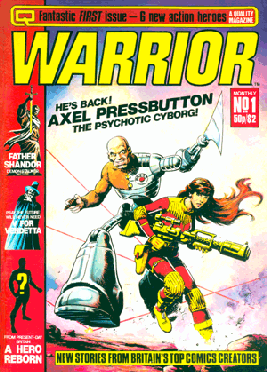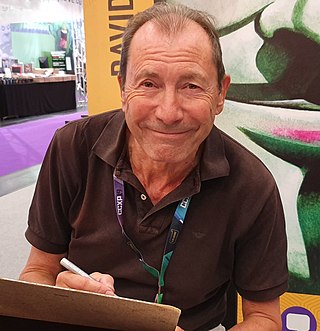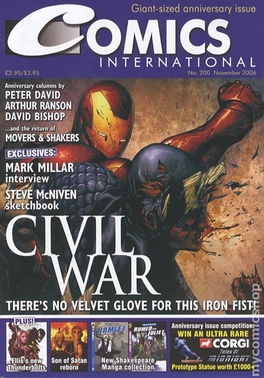
Warrior was a British comics anthology that ran for 26 issues between March 1982 and January 1985. It was edited by Dez Skinn and published by his company Quality Communications. It featured early work by numerous figures who would go on to successful careers in the industry, including Alan Moore, Alan Davis, David Lloyd, Steve Dillon, and Grant Morrison; it also included contributions by the likes of Brian Bolland and John Bolton, while many of the magazine's painted covers were by Mick Austin.

Crisis was a British comic anthology published by Fleetway Publications from 17 September 1988 to October 1991, initially fortnightly and later monthly. Designed to appeal to older readers than other Fleetway titles in order to take advantage of a boom in interest in 'adult' comics, Crisis featured overtly political and complex stories; one issue was even produced in conjunction with Amnesty International.

Eclipse Comics was an American comic book publisher, one of several independent publishers during the 1980s and early 1990s. In 1978, it published the first graphic novel intended for the newly created comic book specialty store market. It was one of the first to offer royalties and creator ownership of rights.

Marvel UK was an imprint of Marvel Comics formed in 1972 to reprint US-produced stories for the British weekly comic market. Marvel UK later produced original material by British creators such as Alan Moore, John Wagner, Dave Gibbons, Steve Dillon, and Grant Morrison.

Derek Graham "Dez" Skinn is a British comic and magazine editor, and author of a number of books on comics. As head of Marvel Comics' operations in England in the late 1970s, Skinn reformatted existing titles, launched new ones, and acquired the BBC license for Doctor Who Weekly. After leaving Marvel UK, Skinn founded and edited Warrior, which featured key works by Alan Moore.

David Lloyd is an English comics artist best known as the illustrator of the story V for Vendetta, written by Alan Moore, and the designer of its anarchist protagonist V and the modern Guy Fawkes/V mask, the latter going on to become a symbol of protest.

Axel Pressbutton is a fictional character appearing in comic books. A violent cyborg with the face of Ernest Borgnine, a button on his chest which delivers orgasmic pleasure when pressed, and a phobia about vegetation, he was created by Steve Moore and Alan Moore, under the pseudonym "Curt Vile".
Steve Parkhouse is a writer, artist and letterer who has worked for many British comics, especially 2000 AD and Doctor Who Magazine.
Quality Communications was a British publishing company founded by Dez Skinn that operated from 1982 to c. 2008. The company's most notable publications were the monthly comics anthology Warrior, which featured early work by writer Alan Moore; and the comics trade magazine Comics International, which Skinn published and edited for 16 years. Quality was involved with comics in both the UK and the U.S., mainly with reprint material from Warrior and repackaging 2000 AD material for the U.S. market.

Comics International was a British news and reviews magazine about comic books. Founded in 1990, it was published monthly by Quality Communications until 2006, and then by Cosmic Publications Ltd. until 2010.
The National Comics Awards was a series of awards for comic book titles and creators given out on an annual basis from 1997 to 2003 for comics published in the United Kingdom the previous year. The votes were by the U.K. comics fan community, and were open to anyone.

Kid Miracleman, whose civilian name is Jonathan James "Johnny" Bates, is a fictional British Golden Age comic book character, originally created by Mick Anglo for publisher L. Miller & Son in 1955, and debuting in Marvelman #102, dated July 10 of that year.
Richard Burton is a British comic publisher and editor who had a lengthy career at IPC Magazines. While an assistant editor at 2000 AD, he became known to readers as Tharg the Mighty's bumbling assistant Burt, who appeared in a number of strips with him. Earlier in his career, Burton published the popular fanzine Comic Media News, and was a co-founder of the Eagle Awards.
John Ridgway is an English comic book artist. He is best known as the first artist of the comic book series Hellblazer, featuring John Constantine.
John Stokes is a British comics artist who has largely worked for IPC and Marvel UK and is best known for his work on Fishboy.

Miracleman is a superhero comic book series, centred on the character of the same name. Originally created by Mick Anglo and published by L. Miller & Son, Ltd. as Marvelman between 1954 and 1963, the character was revived in 1982 for a revisionist story written by Alan Moore, beginning in the pages of British anthology Warrior. From 1985 the character was renamed Miracleman, and the series was continued by American publisher Eclipse Comics until 1993. Since 2009 the rights to the character have been licensed by Marvel Comics, who have published new material.
The House of Hammer was a British black-and-white magazine featuring articles and comics related to the Hammer Film Productions series of horror and science fiction films. The brainchild of Dez Skinn, almost every issue of the magazine featured a comics adaptations of a Hammer film, as well as an original comics backup story, such as the long-running feature Van Helsing's Terror Tales.
The ownership of the comic book character Marvelman was the subject of several legal disputes, both before and after the character was renamed Miracleman in 1985. The character and its derivatives were created by Mick Anglo in 1954 at the request of the publisher Len Miller. Unlike many comic book creators from the period, Anglo retained copyright of the character. Following Anglo's death in 2011, ownership is held by Mick Anglo's estate.
Captain Britain is a British comic feature published by Marvel UK - the British division of Marvel Comics between 1976 and 1985, in various anthology magazines.










